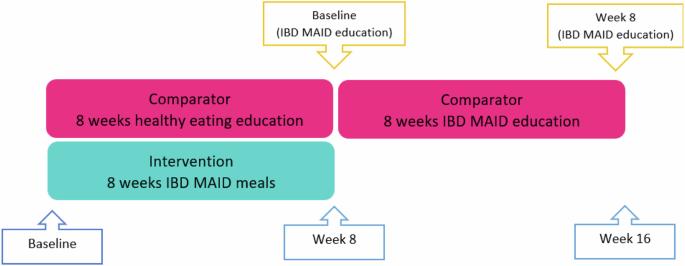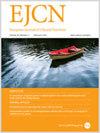一项试点随机对照试验,调查抗炎饮食模式对成人炎症性肠病患者的疾病活动、症状和微生物群特征的影响。
IF 3.6
3区 医学
Q2 NUTRITION & DIETETICS
引用次数: 0
摘要
背景/目的:由于迄今为止的研究存在异质性,因此针对炎症性肠病(IBD)患者的饮食处方缺乏确定性。本研究的目的是调查一种旨在减少食品添加剂摄入量的改良抗炎饮食模式(IBD-MAID)与标准疗法相比,对成人 IBD 患者疾病活动的疗效:成人 IBD 患者被随机分配到 IBD-MAID(提供膳食)[n = 29]或一般健康饮食(GHE)[n = 29],为期 8 周。采用经过验证的工具对疾病活动、粪便热保护蛋白(FC)、C反应蛋白(CRP)、症状和生活质量(S&QOL)进行评估:IBD-MAID 的耐受性和依从性良好(依从性为 92%)。第 8 周时,各组间结果指标与基线相比的变化无显著统计学差异。然而,从基线到第 8 周的分析表明:(1) 接受 IBD-MAID 治疗的患者在 S (p = 0.001) 和 QOL (p = 0.004)、FC (p = 0.007) 和克罗恩病活动度 (p = 0.03) 方面有统计学意义的显著改善,但溃疡性结肠炎患者没有;(2) 接受 GHE 治疗的患者在 QOL 方面有统计学意义的显著改善 (p = 0.015)。对从基线到第 8 周的变化进行的相关分析表明,食物添加剂摄入量的大幅减少与 FC、S 和 QOL 的改善有统计学意义,而抗炎饮食原则与 QOL 的改善一致:结论:IBD-MAID 的耐受性良好。结论:IBD-MAID 的耐受性良好,最新颖的发现是减少食品添加剂摄入量与炎症指标、S 和 QOL 改善之间的相关性。还需要进一步研究食品添加剂暴露对 IBD 病程的影响:12619001500145.本文章由计算机程序翻译,如有差异,请以英文原文为准。


A pilot randomized controlled trial investigating the effects of an anti-inflammatory dietary pattern on disease activity, symptoms and microbiota profile in adults with inflammatory bowel disease
There is a lack of certainty in dietary prescription for individuals with inflammatory bowel disease (IBD) due to heterogeneity in studies to date. The aim of this study was to investigate the efficacy on disease activity of a modified anti-inflammatory dietary pattern purposely designed to reduce intake of food additives (IBD-MAID), compared to standard care, in adults with IBD. Adults with IBD were randomised to IBD-MAID (meals provided) [n = 29] or general healthy eating (GHE) [n = 29] for 8 weeks. Disease activity, faecal calprotectin (FC), C-reactive protein (CRP), symptoms, and quality of life (S&QOL) were assessed using validated tools. The IBD-MAID was well tolerated and adhered to (92% adherence). At week 8, there was no statistically significant difference in change from baseline in outcome measures between groups. However, baseline to week 8 analysis indicated: (1) statistically significant improvements in S (p = 0.001) & QOL (p = 0.004), FC (p = 0.007), and Crohn’s disease activity (p = 0.03) but not ulcerative colitis, in individuals following the IBD-MAID and (2) statistically significant improvement in QOL in individuals receiving GHE (p = 0.015). Correlation analysis on change from baseline to week 8 revealed a greater decrease in food additives intake was associated with statistically significant improvements in FC, S & QOL and alignment of anti-inflammatory dietary principles with improvements in QOL. The IBD-MAID was well tolerated. The most novel finding pertains to the correlation between reduced food additives intake and improvements in inflammatory markers, S&QOL. Further research is needed to explore the effects of food additives exposure on IBD course. 12619001500145
求助全文
通过发布文献求助,成功后即可免费获取论文全文。
去求助
来源期刊
CiteScore
10.60
自引率
2.10%
发文量
189
审稿时长
3-6 weeks
期刊介绍:
The European Journal of Clinical Nutrition (EJCN) is an international, peer-reviewed journal covering all aspects of human and clinical nutrition. The journal welcomes original research, reviews, case reports and brief communications based on clinical, metabolic and epidemiological studies that describe methodologies, mechanisms, associations and benefits of nutritional interventions for clinical disease and health promotion.
Topics of interest include but are not limited to:
Nutrition and Health (including climate and ecological aspects)
Metabolism & Metabolomics
Genomics and personalized strategies in nutrition
Nutrition during the early life cycle
Health issues and nutrition in the elderly
Phenotyping in clinical nutrition
Nutrition in acute and chronic diseases
The double burden of ''malnutrition'': Under-nutrition and Obesity
Prevention of Non Communicable Diseases (NCD)

 求助内容:
求助内容: 应助结果提醒方式:
应助结果提醒方式:


